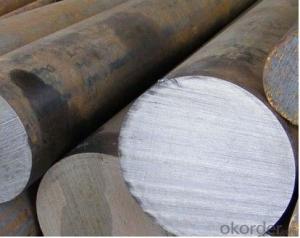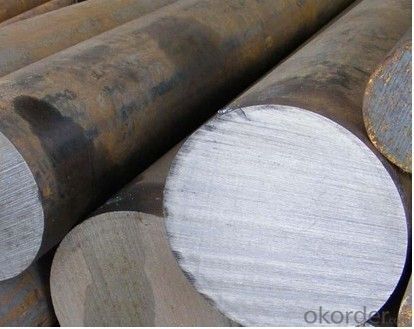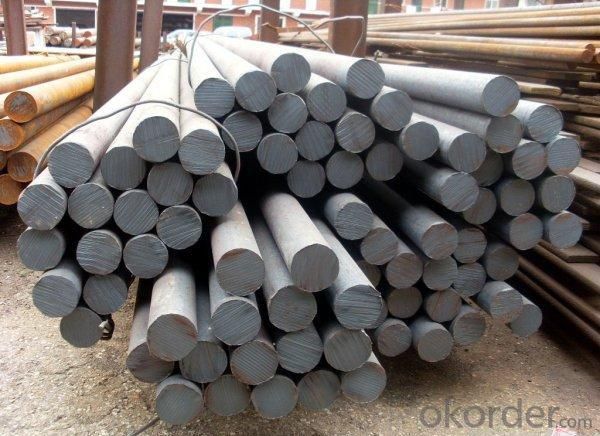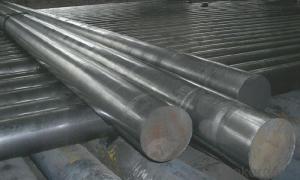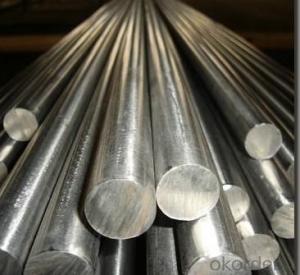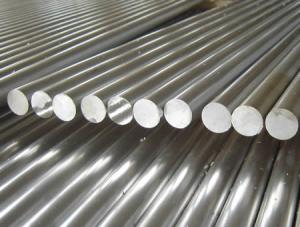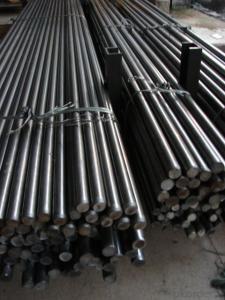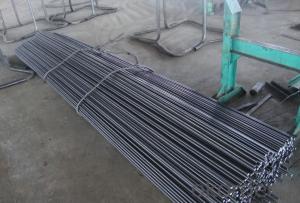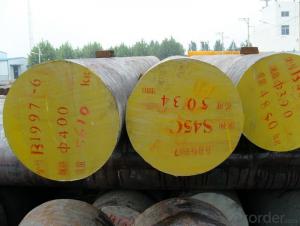Cold Drawn Steel Round Bar with High Quality-100mm-125mm
- Loading Port:
- China Main Port
- Payment Terms:
- TT or LC
- Min Order Qty:
- 100 m.t
- Supply Capability:
- 10000 m.t/month
OKorder Service Pledge
OKorder Financial Service
You Might Also Like
Cold Drawn Steel Round Bar with High Quality-100mm-125mm
Specifications:
1.Size: 100mm-125mm
2.Material: AISI 1045/DIN 1.1191/JIS S45C/GB 45/EN8.
3.Chemical analysis:
C | Si | Mn | P≤ | S≤ | Cr |
0.40~0.60 | 0.20~0.30 | 0.70~0.90 | 0.030 | 0.030 | 0.01~0.03 |
4.Process: EAF + LF + VD + Forged + Heat Treatment (optional)
5.Delivery condition:Hot forged +Rough machined (black surface after Q/T)+ Turned (optional)
6.Technical Data: Chemical Composition, Physical Properties and Mechanical Testing.
7. Test: Ultrasonic test according to SEP 1921-84 3C/c.
8. Standard: GB, AISI, ASTM, DIN, JIS, BS, etc.
9. Quality Management Certification: ISO 9001:2008.
10. Main application:
(1)It is widely used in machinery manufacturing.
(2) For the manufacture of high strength requirements parts, such as gears, shafts, piston pin and the uneven force big machining parts, forgings, stampings and bolts, nuts, pipe joint.
FAQ of Cold Drawn Steel Round Bar with High Quality-100mm-125mm:
Q1: How soon can we receive the product after purchasement?
A1: Within three days of placing an order, we will begin production. The specific shipping date is dependent upon international and government factors, but is typically one month.
Q2: How do you guarantee the quality of our products?
A2: We have established an advanced quality management system which conducts strict quality tests at every step, from raw materials to the final product. At the same time, we provide extensive follow-up service assurances as required.
Q3: The prices are invoicing on theoritical weight or on actual weight?
A3: We can do it in both manners, according to the customers' request.
Images of Cold Drawn Steel Round Bar with High Quality-100mm-125mm:
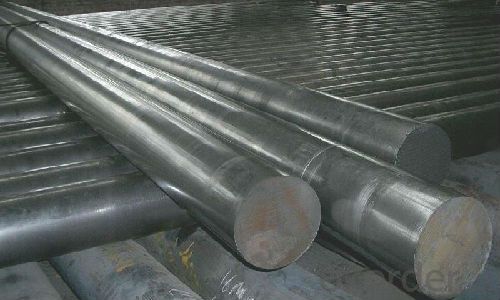
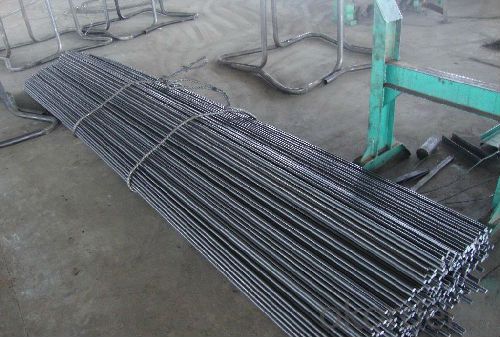
- Q: How do you cut steel round bars?
- To cut steel round bars, there are several methods that can be used depending on the specific requirements and available tools. Here are a few common techniques: 1. Abrasive Cutting: This method involves using an abrasive cutting wheel or disc, usually mounted on a handheld angle grinder or a chop saw. The round bar is secured in place, and the cutting wheel is applied to create a groove on the bar's surface. By applying pressure and rotating the bar, the cutting wheel gradually cuts through the steel. 2. Cold Saw: A cold saw is a specialized machine used for cutting metal. It has a circular blade that operates at a low speed, reducing heat generation during the cutting process. The round bar is securely clamped in place, and the cold saw's blade is lowered onto the bar, cutting through it with precision. 3. Band Saw: A band saw is another machine commonly used to cut steel round bars. It consists of a continuous toothed metal band that rotates on two pulleys. The round bar is secured in a vise, and the band saw is adjusted to the desired cutting angle and speed. The bar is then fed into the blade, which cuts through it smoothly. 4. Torch Cutting: For thicker steel round bars, oxy-fuel torch cutting can be employed. This method involves using a torch that combines oxygen and fuel gas, such as acetylene, to generate a high-temperature flame. The round bar is heated until it reaches a molten state, and then a separate stream of oxygen is directed onto the heated region, causing the steel to oxidize rapidly and form a cut. Regardless of the method used, it is crucial to take proper safety precautions, such as wearing protective goggles, gloves, and ensuring a stable work surface. Additionally, using the appropriate cutting tools and techniques for the specific type of steel being cut is essential to achieve clean and precise cuts.
- Q: Can steel round bars be used in the energy industry?
- Steel round bars are indeed applicable in the energy industry. These bars are widely utilized in numerous energy industry applications owing to their exceptional attributes, including high strength, durability, and corrosion resistance. They find extensive use in the construction of power plants, oil rigs, pipelines, and other energy infrastructure projects. Moreover, machinery and equipment employed in the energy industry, such as turbines, generators, and pumps, are also manufactured using steel round bars. Furthermore, renewable energy technologies, including wind turbines and solar power systems, often incorporate steel round bars. In summary, steel round bars offer versatility and reliability, making them a superb choice for meeting the demanding requirements of the energy industry.
- Q: What is the difference between a turned and a polished steel round bar?
- A turned steel round bar and a polished steel round bar both undergo separate processes that result in different surface finishes and properties. A turned steel round bar is typically created by using a lathe machine to remove material from the surface of a steel bar. This process involves rotating the bar against a cutting tool, which cuts away the outer layer and leaves behind a smooth and cylindrical surface. The turned bar may have visible machining marks due to the cutting process, although it is generally considered to have a more precise and uniform diameter compared to other types of steel bars. Turned bars are often used in applications where dimensional accuracy is crucial, such as in machinery or tooling. On the other hand, a polished steel round bar undergoes a different process that involves grinding or buffing the surface to achieve a smooth and reflective finish. Polishing removes any imperfections or roughness from the surface of the steel bar, resulting in a highly lustrous appearance. Polished bars are often used in decorative applications or where visual aesthetics are important, such as in architectural designs or high-end consumer products. In summary, the main difference between a turned and a polished steel round bar lies in their respective manufacturing processes and resulting surface finishes. A turned bar is machined to achieve precise dimensions, while a polished bar is subjected to a polishing process to obtain a smooth and reflective surface. The choice between the two depends on the specific requirements of the application, with turned bars being preferred for dimensional accuracy and polished bars for aesthetic appeal.
- Q: Cold drawn steel wire is a round bar or thread steel in Construction Engineering?
- Of course it belongs to round bar. Thread steel can not be obtained by cold drawing. Besides, the outer diameter of the cold drawn steel wire is smaller, the surface is smoother and the hardness is slightly higher.
- Q: Can steel round bars be used for making wheel hubs?
- Yes, steel round bars can be used for making wheel hubs. Steel is a common material choice for wheel hubs due to its high strength and durability, making it suitable for withstanding the forces and pressures experienced by wheel hubs during operation.
- Q: Can steel round bars be used in the production of bearings?
- No, steel round bars cannot be used in the production of bearings. Bearings require specific materials that can withstand high loads and offer low friction. Steel round bars are not designed with the necessary characteristics to fulfill these requirements. Instead, bearings are typically made from specialized materials such as chrome steel, stainless steel, or ceramic materials, which offer excellent durability and performance under the demanding conditions in which bearings operate.
- Q: Can steel round bars be used for making security grilles?
- Certainly! Security grilles can be made using steel round bars. Steel, being a sturdy and durable material, offers excellent protection for windows and doors. By welding round bars together, a robust framework for the security grilles can be created. Moreover, steel round bars are highly customizable and can be shaped to fit any size or design requirement, making them suitable for various types of security grilles. The hardness and toughness of steel also make it resistant to cutting or tampering, thereby enhancing the security features of the grilles. All in all, steel round bars are a dependable option for creating security grilles due to their strength, durability, and customization capabilities.
- Q: Can steel round bars be used for making security grilles?
- Yes, steel round bars can be used for making security grilles. Steel is a durable and strong material that provides excellent security for windows and doors. Round bars can be welded together to create a sturdy framework for the security grilles. Additionally, steel round bars can be easily customized and shaped to fit any size or design requirement, making them suitable for various types of security grilles. The hardness and toughness of steel also make it resistant to cutting or tampering, further enhancing the security features of the grilles. Overall, steel round bars are a reliable choice for making security grilles due to their strength, durability, and customization capabilities.
- Q: What are the specifications and standards for steel round bars?
- The specifications and standards for steel round bars vary depending on the intended use and industry requirements. However, there are some general specifications and standards that apply to most steel round bars. Firstly, the dimensions of steel round bars are typically specified in terms of diameter, length, and tolerance levels. The diameter can range from a few millimeters to several inches, and the length can vary as per the customer's needs. The tolerance levels indicate the allowable deviation from the specified dimensions and ensure the bars meet the desired accuracy and consistency. In terms of material composition, steel round bars are predominantly made from carbon steel, alloy steel, or stainless steel. The specific grade and composition of the steel will depend on the application, such as structural, construction, automotive, or aerospace. These grades are established by various organizations, such as the American Society for Testing and Materials (ASTM) or the International Organization for Standardization (ISO), and they define the chemical composition, mechanical properties, and other characteristics of the steel. Regarding mechanical properties, steel round bars must meet certain standards to ensure their strength, ductility, and resilience. These properties include tensile strength, yield strength, elongation, hardness, impact resistance, and more. The standards for these mechanical properties are specified by relevant organizations like ASTM or ISO, and they provide guidelines for manufacturers and users to ensure the bars are suitable for their intended applications. Surface finish is another important aspect of steel round bars. The standard surface finish options include black, peeled, ground, polished, or chrome-plated, among others. These finishes affect the appearance, corrosion resistance, and ability to withstand wear and tear. Furthermore, steel round bars may need to adhere to specific standards for heat treatment, such as annealing, quenching, or tempering, to enhance their mechanical properties or improve their machinability. Overall, the specifications and standards for steel round bars encompass dimensions, material composition, mechanical properties, surface finish, and heat treatment requirements. These standards ensure that steel round bars meet the necessary quality, performance, and safety criteria for their designated applications. It is crucial for manufacturers, suppliers, and end-users to be aware of these specifications and standards to ensure the appropriate selection and use of steel round bars.
- Q: Are steel round bars susceptible to cracking?
- Yes, steel round bars can be susceptible to cracking under certain conditions. Cracking can occur due to factors such as excessive stress, improper handling, or poor manufacturing processes. However, the susceptibility to cracking can be minimized by using high-quality steel, proper heat treatment, and careful handling and installation techniques.
Send your message to us
Cold Drawn Steel Round Bar with High Quality-100mm-125mm
- Loading Port:
- China Main Port
- Payment Terms:
- TT or LC
- Min Order Qty:
- 100 m.t
- Supply Capability:
- 10000 m.t/month
OKorder Service Pledge
OKorder Financial Service
Similar products
Hot products
Hot Searches
Related keywords
